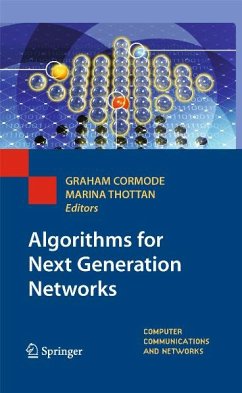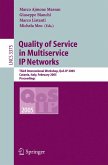This important and timely volume presents a comprehensive survey of the algorithms and methodologies presently used in the design and deployment of the Internet. Issues of network design, network operations and management, and emerging applications are discussed by a collection of experts on the algorithmic foundations of the Internet. Covering topics at the intersection of algorithms and networking, the book builds a complete picture of the current state of research on next generation networks and the challenges for the years ahead.
Topics and features
* Contains a Foreword by Charles R. Kalmanek, and contributions from leading researchers in the field
* Outlines the goals for optimization in network design, considering optimizability of protocols and the optimum placement of network functionality, and presenting the idea of Valiant load balancing
* Investigates the influence of physical network characteristics in the design of robust network services, covering algorithms used for optimal capacity provisioning in optical networks, spectrum management in wireless networks, cross-layer algorithms and resource allocation problems in cellular networks
* Explores algorithms for overlay networks which consider the interactions of different overlay networks and take into account the coexistence of underlay services in the basic network infrastructure
* Examines the challenge of processing packets at high speeds, surveying Hash-based techniques for high speed packet processingand fast packet pattern matching algorithms
* Discusses the issue of network management in the face of ever increasing heterogeneity in applications, surveying anomaly detection approaches and network monitoring
* Reviews the algorithmic techniques behind emerging applications, surveying the evolution of Internet search applications, online gaming and social networking
Promoting a thorough understanding of the algorithms used by the Internet today as the critical basis for the development of new algorithms that will form the future Internet, this essential text will be of interest to a broad readership - from graduate students to researchers in data networking.
Dr. Graham Cormode is a Technical Specialist at AT&T Labs Research. Dr. Marina Thottan is a Member of Technical Staff at Bell Labs Research.
Dieser Download kann aus rechtlichen Gründen nur mit Rechnungsadresse in A, B, BG, CY, CZ, D, DK, EW, E, FIN, F, GR, HR, H, IRL, I, LT, L, LR, M, NL, PL, P, R, S, SLO, SK ausgeliefert werden.
"Understanding the science behind the networks of today is the necessary foundation for making significant contributions to the rapid evolution of next generation networks. This timely book comprised of chapters from authoritative experts provides an excellent overview of algorithms that form the basis of next generation communication networks. It covers problems ranging in scope from physical layer issues to the design of next generation applications. I strongly recommend this valuable book as essential reading for students, practitioners and researchers who are actively engaged in creating the emerging next generation communication networks."
Debasis Mitra, Bell Laboratories
"A few months ago a colleague at Georgia Tech asked me 'Which are the top-10 most significant algorithms that have been developed by networking research in the last decade?' This book would provide an excellent answer. Covering a wide range of topics from the entire spectrum of networking research, this book is highly recommended for anyone that wants to become familiar with the 'network algorithmics' state-of-the-art of the evolving Internet."
Constantine Dovrolis, Georgia Institute of Technology
"This book addresses issues surrounding the evolution of the Internet as it matures in the early 21st century. ... The focus on algorithms to augment and in some cases replace historical ad hoc designs is timely. ... book should be useful to researchers in the field who seek to establish firm foundations for their work. ... Each paper has extensive references, and the book has an adequate index. It mercifully steers clear of policy considerations such as Net neutrality." (J. S. Edwards, ACM Computing Reviews, August, 2010)









